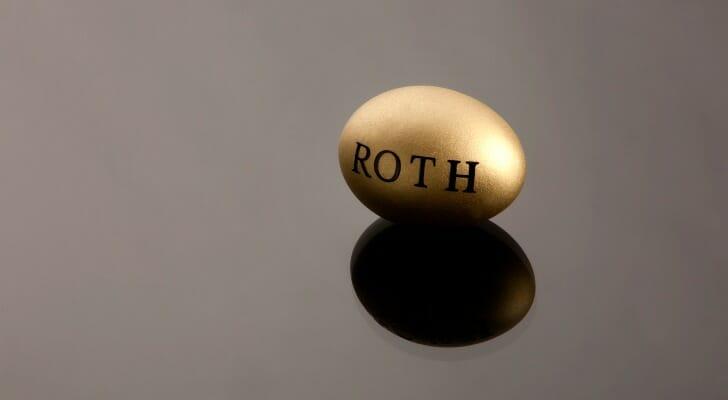
Investing is a key component of any plan to build wealth. And when shaping that plan, it’s important to consider two things: what to invest in and where to keep that money. A mutual fund, for example, is a popular choice for what to invest in; it’s a basket of securities in one place. Where to keep that money is another question: It’s possible to own one or more mutual funds inside a Roth individual retirement account. Whether you invest in a Roth IRA or mutual fund, both can help with achieving your wealth-generation goals. But it’s important to understand how they differ and the risks and rewards associated with each.
There are lots of choices to make when building an investment portfolio, and a financial advisor’s insights can be immensely helpful during this process.
Mutual Funds, Explained
A mutual fund represents a pooled investment in which multiple investors come together to put their money into a basket of securities. That typically means stocks and bonds, though mutual funds can also hold real estate investments, commodities or precious metals.
Investing in a mutual fund is different from purchasing an individual stock or bond. Instead of just one security, you can gain exposure to many which can help with diversification. The cost of investing in mutual funds is typically measured in terms of the expense ratio. This represents what investors pay to own a mutual fund on a yearly basis, expressed as a percentage.
Mutual funds can follow an active management or passive management strategy. With actively managed funds, a fund manager regularly reviews the fund’s holdings and decides when to sell off investments or add new ones. These mutual funds can have a higher expense ratio as a result.
Passive management is more hands-off, with less turnover of fund assets. An index fund, for example, usually follows a passive strategy as its goal is not to beat the market but to match the performance of a specific index or benchmark, such as the S&P 500. Passive funds can produce consistent returns over time, often with lower expense ratios.
Roth IRA, Explained
A Roth IRA is a tax-advantaged account that’s designed to be used for retirement savings. Some of the key features that distinguish a Roth IRA from a taxable brokerage account include:
With a brokerage account, you’re free to contribute as much as you like in any given year. A Roth IRA, on the other hand, is subject to annual contribution limits set by the IRS. The same is true for its traditional IRA counterpart. For 2021, the annual cap on contributions to either type of IRA is set at $6,000, with an additional $1,000 catch-up contribution allowed for people aged 50 or older.
In terms of who can contribute to a Roth IRA, this is based on your tax filing status and income. For 2021, single filers with a modified adjusted gross income of under $140,000 can make a full Roth IRA contribution. Married couples filing jointly with a MAGI of less than $208,000 can do so. Contributions are eventually phased out for people earning above these thresholds.
Perhaps the best feature of a Roth IRA is that qualified withdrawals are 100% tax-free. That’s because these accounts are funded with after-tax dollars. Since you already paid tax on the money when you added it to your Roth IRA, you don’t have to pay it again when you take that money out. And unlike a traditional IRA, you’re not required to take minimum distributions from a Roth IRA once you reach a certain age. Early withdrawals, however, may be subject to early withdrawal penalties and ordinary income tax.
Roth IRA vs. Mutual Fund: Which Is Better?
The most important thing to know about investing in a Roth IRA vs. mutual funds is that they’re not mutually exclusive. A mutual fund is a type of investment, which matters for choosing your asset allocation. A Roth IRA is one place you could keep that type of investment; in other words, it’s an option for asset location. It’s possible to build a portfolio of mutual funds inside a Roth IRA, alongside investments you may own in a 401(k) at work, a taxable brokerage account or even a Health Savings Account (HSA).
The type of mutual funds you have access to can depend largely on where you choose to open a Roth IRA. You can open a Roth IRA with:
Any of those could allow you to purchase mutual fund investments. One thing to note, however, is that some of these entities may offer Roth IRA CDs in lieu of a regular Roth IRA. A Roth IRA CD is a certificate of deposit account that enjoys the tax features and benefits of an IRA. As CDs are generally considered some of the safest investments, you may not earn the same returns with a Roth IRA CD that you would with a regular Roth IRA that’s invested in mutual funds and other securities.
Invest With a Roth IRA and Mutual Funds
If you’re interested in opening a Roth IRA, first make sure that you’re eligible to do so, based on your income and tax filing status. If you’re within the MAGI guidelines, the next step is choosing where to open your account. Of the options listed above, an online brokerage may be the easiest way to get started. And you can also open a taxable brokerage account at the same time, which means more opportunities to invest in mutual funds.
When it comes to choosing mutual funds for a Roth IRA, tax efficiency and turnover ratios matter. An actively managed fund that frequently turns over assets and triggers capital gains events could be a good fit inside a Roth IRA. Since your IRA is tax-advantaged already that can help to minimize your investment tax on gains. A passively managed index fund or an exchange-traded fund (ETF) on the other hand, could be a better fit for a taxable brokerage account.
As mentioned, passively managed mutual funds tend to have lower turnover already. An ETF is a mutual fund that trades on an exchange like a stock. These can also have active or passive management strategies. By keeping passively managed funds or ETFs in a taxable brokerage account, you can potentially minimize your tax liability on gains.
The Bottom Line
If you’re weighing a Roth IRA vs. a mutual fund for investing, keep in mind that it doesn’t have to be an either-or situation. You can use both to invest for the long term. The key is understanding the difference between asset location and asset allocation and how the two work together. Roth IRA contributions are after-tax. Unless a mutual fund is in a tax-advantaged account contributions are pre-tax.
Tips for Investing
-
Consider talking to your financial advisor about the differences between Roth IRAs vs. mutual funds and how to leverage them in your investment plan. If you don’t have a financial advisor yet, finding one doesn’t have to be difficult. SmartAsset’s financial advisor matching tool makes it easy to connect with professional advisors in your local area. You can get your personalized advisor recommendations online in minutes. If you’re ready, get started now.
-
In order to help you construct your investment portfolio, try out SmartAsset’s asset allocation calculator. You can enter your risk tolerance and get some help in choosing securities for your portfolio.
-
If you’re interested in opening a Roth IRA with an online brokerage, take time to compare different platforms. Specifically, look at the variety of investments available as well as what you’ll pay to invest. Again, with mutual funds and ETFs, the emphasis is on fund expense ratios. But if you’re also opening a taxable account to trade individual stocks or other investments, check out the commission fees you’ll pay.
Photo credit: ©iStock.com/jygallery, ©iStock.com/relif, ©iStock.com/pixelfit
The post Roth IRA vs Mutual Fund: Key Differences appeared first on SmartAsset Blog.


